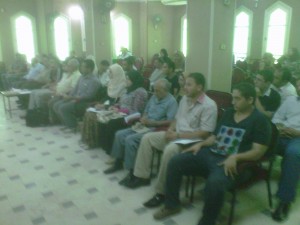 The Cairo Institute for Human Rights Studies (CIHRS) held a public lecture, on Saturday, August 4, entitled “Independence of the Judiciary and President’s Powers to Halt Military Trials” at the premises of the Young Muslim Women’s Association in Beni-Suef. The lecture was delivered by Ahmed Ragheb, attorney-at-law and member of “No to Military Trials for Civilians” Group.
The Cairo Institute for Human Rights Studies (CIHRS) held a public lecture, on Saturday, August 4, entitled “Independence of the Judiciary and President’s Powers to Halt Military Trials” at the premises of the Young Muslim Women’s Association in Beni-Suef. The lecture was delivered by Ahmed Ragheb, attorney-at-law and member of “No to Military Trials for Civilians” Group.
The lecture was attended by more than fifty participants from different backgrounds, age groups and political attitudes, a matter that significantly enriched the debate in the lecture which lasted for approximately two hours.
The lecture began with introduction by Sally Toma, Human Rights Education Program Officer at CIHRS, about “Our Right in 100 Days” Campaign, revealing the Campaign’s demands, objectives and degree of its correlation to the subject of the lecture, i.e. halting of civilians’ referral to military trials and determination of President’s powers relevant to this issue, being one of the most important demands set forth in the campaign memorandum sent to President Morsi during the first days of his reign.
Mr. Ragheb generally focused on the review of the legal and historical framework of establishing military judiciary and its relationship to civilians’ referral to military trials that began in the 1960, and the political context through which activists and political opponents have been referred to extraordinary courts as one of the tools used by the State to eradicate political opponents while the aim behind the establishment of such courts was to control and manage armed forces activities during war times. He stated that such trials are still violating the simplest rules of fair and equitable trials and infringing civilians’ rights to appear before ordinary judge.
Mr. Ragheb also dealt with the significance of adopting the issue of military trials on broader and more global range as military justice is, on one hand, fully affiliated, according to the law on its establishment, to one of the State Executive Organs, i.e. the Ministry of Defense, a matter that may significantly impact the independence of its decisions, and the number of civilians, on the other hand, who have been referred to military trials exceeded 12000 since January Revolution, most of them were students, workers and activists who are usually stigmatized as “thugs” and rioters.
“The State should make an apology to the victims of military trials and pledge to punish those who are proven to be involved in committing violations against detainees, being the simplest reparation to be made to them”, stated Ragheb.
Mr. Ragheb emphasized on the need for drawing attention of the drafters of the upcoming Constitution of Egypt to the importance of immunizing civilians’ rights to appear before ordinary judge and of halting civilians’ referral to military trials. This is to be made in parallel with reconsidering the Military Code of Justice by effectuating legal mechanism for restructuring military justice as it is evident that the State has no political will to deal with this issue in adequate level of seriousness. President Morsi’s exercise of powers in pardoning a group of detainees on the occasion of the Month of Ramadan was the worst act expected to be committed by him, especially that he has powers that have not been exercised yet in the release of other detainees whose rights to retrial and the end of suffering in military prisons have not – adequately – highlighted, added Ragheb.
It is worth mentioning that “Our Right in 100 Days” is a human rights campaign launched by the Forum of Independent Human Rights Organizations with the aim of imposing human rights priorities on the agenda of President Mohammad Morsi. The Campaign involves many events that will be announced successively on https://cihrs.org/100youm/ or (#100youm) on Twitter.
Share this Post

